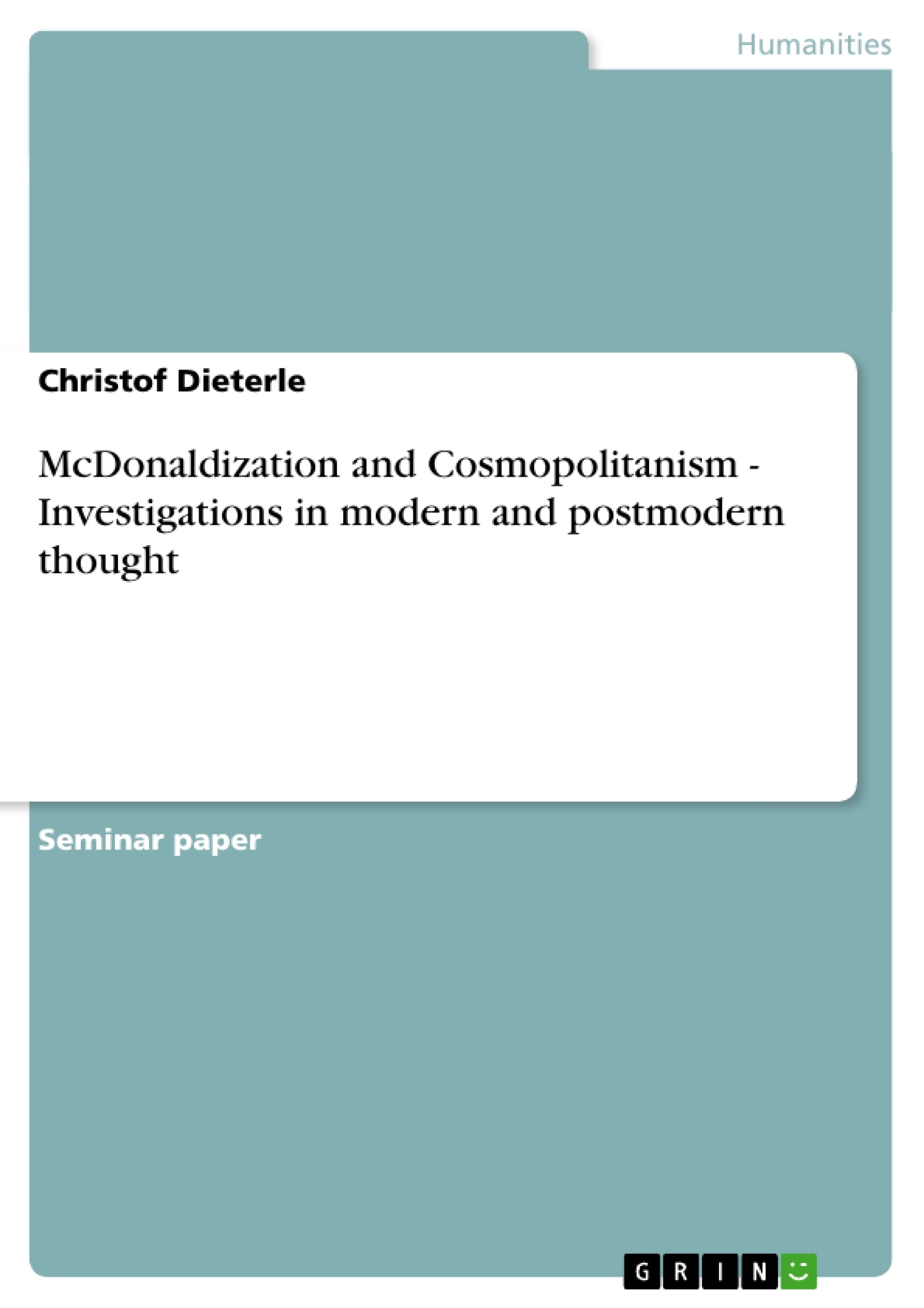The study of contemporary culture faces some fundamental problems in finding, both ontological and analytical, a clear distinction between modern and postmodern approaches to the question of how global culture can be understood. In the case of the two concepts of McDonaldization and cosmopolitanism, I try to show that such a distinction is not only redundant, but can also lead to difficulties in explaining the various cultural phenomena associated with these concepts that can be observed all around the globe on a daily basis. Obviously, choosing those two concepts to “build a bridge” between modern and post-modern theoretical approaches to global culture is not a random act. Current debates in the field of cultural sociology show that the concepts of McDonaldization and cosmopolitanism are mainly regarded as examples of modernity and postmodernity. The inherent rationality in the concept of McDonaldization is regarded as prototypically modern (Ritzer 1996, Berger/Huntington 2002, Rosenau 2003), whereas the concept of cosmopolitanism is mainly associated with change, complexity or post-territoriality, all of which are postmodern concepts (Hannerz 1996, Urry 2003, Hill 2000). This seemingly clear distinction between the aforementioned concepts will be challenged in this paper and some of the inherent features of McDonaldization and cosmopolitanism will be used to establish analytical links between modern and postmodern views on contemporary global culture.
In order to establish connections between these two seemingly contradictory concepts, the most important step will be to get a clearer idea of their inherent features from a modern and from a post-modern perspective. Thus, in the chapter following these introductory remarks, I will put the concepts of McDonaldization and Cosmopolitanism under close scrutiny as far as their perception from the respective viewpoints is concerned.
Inhaltsverzeichnis (Table of Contents)
- 1. INTRODUCTION
- 2. ANALYZING THE CONCEPTS OF MCDONALDIZATION AND COSMOPOLITANISM
- 2.1 THOUGHT MODEL A: A MODERN APPROACH TO MCDONALDIZATION
- 2.1.1 Efficiency
- 2.1.2 Calculability
- 2.1.3 Predictability
- 2.1.4 Control through technology...
- 2.1.5 Summary..
- 2.2 THOUGHT MODEL B: A POSTMODERN APPROACH TO MCDONALDIZATION
- 2.2.1 Jean-François Lyotard..
- 2.2.2 Jean Baudrillard..
- 2.2.3 Summary....
- 2.3 THOUGHT MODEL C: A MODERN APPROACH TO COSMOPOLITANISM
- 2.3.1 Cosmopolitanism and Enlightenment Philosophy
- 2.3.2 Ulrich Beck on cosmopolitanism........
- 2.3.3 Summary...
- 2.4 THOUGHT MODEL D: A POSTMODERN APPROACH TO COSMOPOLITANISM
- 2.4.1 Ulf Hannerz: Cosmopolitanism as a mode of managing meaning
- 2.4.2 James Rosenau's local and global worlds..
- 2.4.3 Summary.
- 2.5 THE CONCEPTUAL OVERLAP
- 2.5.1 Hypothesis I: A modern concept of McDonaldization is a necessary condition for post-Enlightenment cosmopolitanism...
- 2.5.2 Hypothesis II: Consumer society and the sign-value are necessary conditions for McDonaldization and cosmopolitanism.
- 2.5.3 Hypothesis III: The World risk society rests on McDonaldization and is constrained by language games....
- 3. CONCLUSION.
Zielsetzung und Themenschwerpunkte (Objectives and Key Themes)
This paper aims to bridge the gap between modern and postmodern approaches to understanding global culture, specifically focusing on the concepts of McDonaldization and cosmopolitanism. By analyzing these concepts from both perspectives, the author challenges the often-assumed distinction between modernity and postmodernity in contemporary cultural phenomena.
- The inherent rationality of McDonaldization as a modern phenomenon.
- Cosmopolitanism as a representation of postmodernity and its association with change, complexity, and post-territoriality.
- The interconnectedness of rational, modern aspects of McDonaldization with concepts like multiple identities and the relativity of culture.
- The potential for combining modern and postmodern thought to gain new perspectives on contemporary global culture.
- Examining the conceptual overlap between McDonaldization and cosmopolitanism through several hypotheses.
Zusammenfassung der Kapitel (Chapter Summaries)
- 1. Introduction: This chapter sets the stage for the analysis by highlighting the difficulty in clearly distinguishing between modern and postmodern approaches to understanding global culture. It then introduces McDonaldization and cosmopolitanism as key concepts for exploring this distinction, arguing that their perceived association with modernity and postmodernity, respectively, is not as straightforward as it may seem. The chapter outlines the paper's goal to bridge this gap and establish analytical links between modern and postmodern perspectives.
- 2. Analyzing the concepts of McDonaldization and Cosmopolitanism: This chapter delves into a detailed analysis of the concepts of McDonaldization and cosmopolitanism, examining their different meanings from both modern and postmodern perspectives. The chapter presents a matrix showcasing different theoretical models for understanding these concepts, focusing on a modern approach to McDonaldization, a postmodern approach to McDonaldization, a modern approach to cosmopolitanism, and a postmodern approach to cosmopolitanism. The chapter concludes with a discussion of the "conceptual overlap" between these two seemingly contradictory concepts, presenting several hypotheses that suggest potential areas for further research.
Schlüsselwörter (Keywords)
This paper focuses on the key concepts of McDonaldization, cosmopolitanism, modernity, postmodernity, global culture, rationalization, efficiency, calculability, predictability, control through technology, multiple identities, the relativity of culture, and the conceptual overlap between these terms. It explores how these concepts can be used to understand the complexities of contemporary global culture.
Frequently Asked Questions
What is the difference between McDonaldization and Cosmopolitanism?
McDonaldization represents modern rationality and efficiency, while Cosmopolitanism is often associated with postmodern complexity and post-territoriality.
Why does the author challenge the modern/postmodern distinction?
The author argues that these concepts overlap and that modern rationality is often a necessary condition for postmodern cultural phenomena.
What are the four dimensions of McDonaldization?
Based on Ritzer's theory, they are efficiency, calculability, predictability, and control through technology.
How does Ulrich Beck view cosmopolitanism?
Beck views it within the context of the "world risk society," where global challenges require a cosmopolitan outlook beyond national borders.
What is the "conceptual overlap" mentioned in the paper?
It refers to areas where modern rational structures (McDonaldization) and postmodern modes of managing meaning (Cosmopolitanism) intersect in global culture.
- Arbeit zitieren
- Christof Dieterle (Autor:in), 2005, McDonaldization and Cosmopolitanism - Investigations in modern and postmodern thought, München, GRIN Verlag, https://www.grin.com/document/44420



